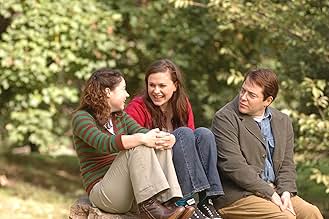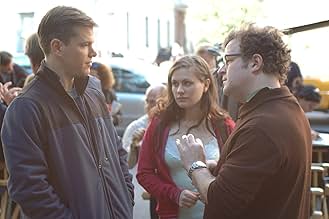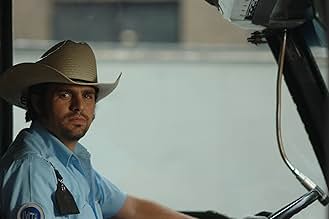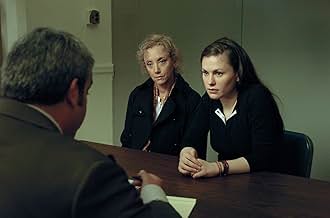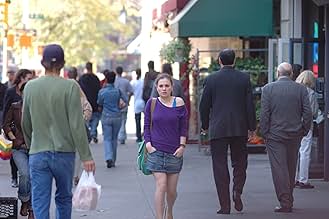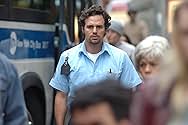Margaret
- 2011
- Tous publics
- 2h 30m
IMDb RATING
6.5/10
19K
YOUR RATING
A high-school student feels responsible for a fatal traffic accident and tries to make amends.A high-school student feels responsible for a fatal traffic accident and tries to make amends.A high-school student feels responsible for a fatal traffic accident and tries to make amends.
- Awards
- 10 wins & 18 nominations total
- Director
- Writer
- All cast & crew
- Production, box office & more at IMDbPro
Featured reviews
Margaret – CATCH IT (B+) Margaret is very interesting movie about a teenage girl partially involved in woman death in a brutal accident. The movie deals with how she is wants the bus driver to at least accept his mistake too and have some remorse or gilt. The movie takes to her journey how she tries to deal with her conscious. She is now torn apart with frustration and begins to emotionally brutalizing her family, her friends, her teachers, and most of all, herself. Anna Paquin's performance as Margaret is terrific. She literally lived the role. From start to finish you won't be able to take your eyes off her, she may now always be remembered as Sookie Stackhouse but here she shows how incredible emotional range she has as an artist. Alison Janney is her death sequence was amazing. It maybe was a 5mintse scene but she sold her death to us and we can now imagine why Lisa was so heartbroken because of her death. J.Smith-Cameron is superb as Lisa's mom. Mark Ruffalo, Matt Damon, John Gallager JR, Kieran Culkin, Rosemarie DeWitt, Jene Rene and Matthew Broderick did a decent job in their respective small yet pivotal roles. In the end Margaret is a nice movie and only flaw it has is its incredibly long without any reason. The movie could have been easily cut into hour and half by eliminating extra scenes or views of New York City.
Shot back in 2005, after a long history of editing problems, this film finally got released in 2011, and debuted on DVD in 2012, with an extended director's cut (I guess) included. Unfortunately, I accidentally watched the shorter (still two and a half hour) version. I'm not sure I'd want to sit through another half hour of this. It's a good film, at its heart. The story is very good, anyway. My big problem with it is that the central character, played by Anna Paquin, is such an unlikeable, pretentious little snot I eventually just stopped caring about what was going on. It's a totally realistic depiction of a teenager, but it reminds me how much I hate teenagers, or at least teenagers like her. Frankly, most of the rest of the characters are equally as obnoxious. I was extremely glad to see Jeannie Berlin call Paquin out on her bullcrap, but she's just as detestable. I found it hilarious that Paquin mistakenly calls her "strident," which she thinks means "pig-headed" or something but which actually means "shrill." The whole film is honestly pretty shrill. The story revolves around Paquin causing a bus accident. At first, she lies about it, then later she feels bad about it and tries to recant her statement.
Margaret (2011)
A terrific, evolving, and in-obvious story line mixed with a lead performance by Anna Paquin to die for makes "Margaret" fabulous. See it for her performance alone.
If you think this is a new movie you'll notice some famous actors who look rather young--Matt Damon in particular in his role as a likable high school teacher. That's because it was filmed in 2005 (and got held up in post-production). Even so it doesn't feel dated. The main themes hold up really well, and are told with unusually frank terms. Many people really are just greedy and selfish at heart.
The key event happens early on and in a way can't even be mentioned here. But it's safe to say that Paquin, who's character is called Lisa Cohen, at first takes a false stance in a moment of crisis and compassion. But the truth of the matter eats at her, and against the rising tide of people who prefer the lie she becomes increasingly principled. In the end it is almost everyone who is morally corrupt, even in his own way her teacher.
There is one lurking problem to the movie that really hurt it. One is the way the initial crisis is filmed (with Mark Ruffalo as a bus driver). It is exaggerated and makes the circumstances leading to tragedy unlikely just when the rest of the movie depends on likelihood. Since this is the lynchpin of everyone's reactions later on, it matters rather too much to ignore.
But the rest of it, from the main plot and Paquin to the various sub-plots including a romantic affair her mother has and some political conflicts about Arab-Israeli relations and the 9/11 events, is all really sharply delineated and well acted. And it's written with a good ear for dialog. It simply makes sense. The fact that there is no silver lining here, and that people are shown so obviously ugly below the surface, is harder to do than you might think. All admirable stuff.
A terrific, evolving, and in-obvious story line mixed with a lead performance by Anna Paquin to die for makes "Margaret" fabulous. See it for her performance alone.
If you think this is a new movie you'll notice some famous actors who look rather young--Matt Damon in particular in his role as a likable high school teacher. That's because it was filmed in 2005 (and got held up in post-production). Even so it doesn't feel dated. The main themes hold up really well, and are told with unusually frank terms. Many people really are just greedy and selfish at heart.
The key event happens early on and in a way can't even be mentioned here. But it's safe to say that Paquin, who's character is called Lisa Cohen, at first takes a false stance in a moment of crisis and compassion. But the truth of the matter eats at her, and against the rising tide of people who prefer the lie she becomes increasingly principled. In the end it is almost everyone who is morally corrupt, even in his own way her teacher.
There is one lurking problem to the movie that really hurt it. One is the way the initial crisis is filmed (with Mark Ruffalo as a bus driver). It is exaggerated and makes the circumstances leading to tragedy unlikely just when the rest of the movie depends on likelihood. Since this is the lynchpin of everyone's reactions later on, it matters rather too much to ignore.
But the rest of it, from the main plot and Paquin to the various sub-plots including a romantic affair her mother has and some political conflicts about Arab-Israeli relations and the 9/11 events, is all really sharply delineated and well acted. And it's written with a good ear for dialog. It simply makes sense. The fact that there is no silver lining here, and that people are shown so obviously ugly below the surface, is harder to do than you might think. All admirable stuff.
6mbs
The film is just over two and a half hours long and while it doesn't fly on by--it doesn't slowly crawl on by either. There are a lot of scenes that flow really really nicely into other scenes that might not have to do with the main plot line but seem to belong in the movie all the same. I can kind of see why the writer/director had trouble trimming it even at two and a half hours, its hard to tell where or what to trim since the main plot line of the movie isn't really the point so much as all the establishing things that contribute to Lisa's mood and state of mind as the movie progresses. (i think) If you're reading this you probably already know the main plot line--teenage girl Lisa causes massive bus accident resulting in a single death, and spends the rest of the movie both breaking down emotionally and trying to right what she feels she did wrong. (the accident is really, really not entirely her fault, but she feels enormous guilt just the same as she should) Anna Paquin gives an incredible performance here--i don't just mean that Paguin's performance is really emotional (which it is)--or that she feels like a real life teenager here (so confident in her rightness, so prone to outbursts when her rightness isn't so right) i mean that Paquin's performance really, pretty much completely single-handedly holds this entire jumble together into one coherent narrative--and for that she's almost like Kenneth Lonnigran's equivalent to Ben Gazzara here. We follow her as she runs into all sorts of people, and we follow her thru all of her mood swings and somewhat pointless arguments that she picks with some of these people, and completely well reasoned arguments that she picks with others...she's the kind of well intentioned but guilt racked protaginist you would expect to find in a novel or a play, or maybe a really good ongoing TV series--but definitely not a film with a definitive arc which is what makes her character that much more surprising.
The film really did call to mind some of John Cassavettes' films in both its rambling yet always moving forward (but never exactly straight forward) narrative and the many, many set pieces consisting of minute characters just talking....not to mention all the natrualistic scenes of Lisa just hanging out in her element. (meaning in school, with friends, arguing with her mom, etc) Movie is very very dialog heavy and yet somehow it never comes across as trying to strong-arm you into a specific point of view, at least until the last half hour or so--as its main character eventually and forcefully takes one on of her own.
This is a movie that for all of its strengths has plenty of weaknesses in it as well. For one thing I'm not sure what the heck Jean Reno is doing here exactly. I'm only slightly less curious about what the heck Matt Damon is doing here also. (was he supposed to be Lisa's moral compass? because his character doesn't really make any sense really. If there's one character who seems like he should have had more screen time it would have to be him) i'm not enitrely sure why we keep cutting back to Matthew Broderick who outside the scenes of him moderating English class debates (?!?!) doesn't seem to have much of a character to play. i'm not entirely sure the ending justified the extreme buildup--i'm also not sure how realistic that ending decision actually is either, but i'll let that go just because the movie had to have an ending. Even tho I enjoyed the constant cutting back to Lisa's mom's storyline (J Smith Cameron is pretty good here too i should point out)--i'm not even sure all of that was necessary to tell Lisa's story so thoroughly--even if the relationship between the mom and the daughter i think is supposed to be the backbone of the movie...and yet with all of these questionable elements just kind of thrown on in there one on top of the other, (like they're all so tightly wound together that it would be hard to pick one off without feeling like something was missing i should add)--- the movie does remain really quite watchable right up until the end--anchored very nicely by the excellent work of Anna Paquin so really that's a feat just by itself i think. This is a film that will be overrated by some, and too easily dismissed by many others...yet this definitely is a challenging film and one that i think should make a pretty good civics lesson to some high school/college students in the years ahead--provided schools are still teaching civics in the years ahead.
The film really did call to mind some of John Cassavettes' films in both its rambling yet always moving forward (but never exactly straight forward) narrative and the many, many set pieces consisting of minute characters just talking....not to mention all the natrualistic scenes of Lisa just hanging out in her element. (meaning in school, with friends, arguing with her mom, etc) Movie is very very dialog heavy and yet somehow it never comes across as trying to strong-arm you into a specific point of view, at least until the last half hour or so--as its main character eventually and forcefully takes one on of her own.
This is a movie that for all of its strengths has plenty of weaknesses in it as well. For one thing I'm not sure what the heck Jean Reno is doing here exactly. I'm only slightly less curious about what the heck Matt Damon is doing here also. (was he supposed to be Lisa's moral compass? because his character doesn't really make any sense really. If there's one character who seems like he should have had more screen time it would have to be him) i'm not enitrely sure why we keep cutting back to Matthew Broderick who outside the scenes of him moderating English class debates (?!?!) doesn't seem to have much of a character to play. i'm not entirely sure the ending justified the extreme buildup--i'm also not sure how realistic that ending decision actually is either, but i'll let that go just because the movie had to have an ending. Even tho I enjoyed the constant cutting back to Lisa's mom's storyline (J Smith Cameron is pretty good here too i should point out)--i'm not even sure all of that was necessary to tell Lisa's story so thoroughly--even if the relationship between the mom and the daughter i think is supposed to be the backbone of the movie...and yet with all of these questionable elements just kind of thrown on in there one on top of the other, (like they're all so tightly wound together that it would be hard to pick one off without feeling like something was missing i should add)--- the movie does remain really quite watchable right up until the end--anchored very nicely by the excellent work of Anna Paquin so really that's a feat just by itself i think. This is a film that will be overrated by some, and too easily dismissed by many others...yet this definitely is a challenging film and one that i think should make a pretty good civics lesson to some high school/college students in the years ahead--provided schools are still teaching civics in the years ahead.
On the day of its cinema release, Kenneth Lonergan's long-gestating drama was the most successful film in the UK. Problem was, it only opened on one screen. The story of Margaret's production is likely a fascinating story in itself, not least because of Martin Scorsese and Thelma Schoonmaker's input into the final edit, which was presumably a return favour for Lonergan's work on the screenplay for Gangs of New York. But I'll focus on the fascinating story that Lonergan has told with this film.
Ostensibly the tale centres on a New York schoolgirl named Lisa (Anna Paquin, defining her young adulthood just as she defined herself in childhood with The Piano), who inadvertently causes a fatal road accident. What follows is the emotional aftermath, fought outwardly with her mother, as a moral and ethical war wages within her hormone-ravaged body.
The performances are excellent throughout, particularly Paquin and J. Smith-Cameron as the daughter and mother caught in gravitational flux. Jean Reno gives fine support as the sad-sack Ramon, while Matthew Broderick delivers the poem (by Gerard Manley Hopkins) that provides the film's title, while suggesting the entire life of his character by the way he eats a sandwich. It's that kind of film.
I recently wrote a review of Winter's Bone, which I described as an anti-youth movie. Margaret could be a companion piece in this regard, cautioning against the bright-eyed naivety of youthful independence, and promoting the importance of family. Like Winter's Ree, Lisa is a lost soul; unlike Ree, Lisa is not someone we admire. But she is always in focus; Lonergan expects not for us to like her, only to understand her. In maintaining this focus, Lonergan himself achieves the admirable: weaving a narrative whose minute details and labyrinthine arguments mirror the broader existential vista against which they are dwarfed.
Margaret goes deeper than Winter's Bone, delivering something pleasingly unexpected: a kind of Sartrean modern fable about the isolating nature of subjectivity. Like her actor mother on the stage, and like us all in our semi-waking lives, Lisa is the main player in her great opera. She performs the social functions that enable her to cling to a sense of belongingness, but something gnaws at her soul. And when, after the accident, she seeks some kind of meaning, she is met at once by indifference, before being seduced by those very institutions that make indifference normal. Nothing in the material world satisfies Lisa; nothing can match her aspirations. The suggestion here, I feel, is that our despair emerges from the disparity between that which we hope for and that which reality can deliver.
No wonder it took so long to find its way to a single UK screen: a three-hour existentialist play is a tough sell. Ten years after the towers sank to Ground Zero, Margaret joins There Will Be Blood, The Assassination of Richard Nixon, and (for some) Zodiac in the pantheon of modern classics that map the American psyche in the post-9/11 world.
Ostensibly the tale centres on a New York schoolgirl named Lisa (Anna Paquin, defining her young adulthood just as she defined herself in childhood with The Piano), who inadvertently causes a fatal road accident. What follows is the emotional aftermath, fought outwardly with her mother, as a moral and ethical war wages within her hormone-ravaged body.
The performances are excellent throughout, particularly Paquin and J. Smith-Cameron as the daughter and mother caught in gravitational flux. Jean Reno gives fine support as the sad-sack Ramon, while Matthew Broderick delivers the poem (by Gerard Manley Hopkins) that provides the film's title, while suggesting the entire life of his character by the way he eats a sandwich. It's that kind of film.
I recently wrote a review of Winter's Bone, which I described as an anti-youth movie. Margaret could be a companion piece in this regard, cautioning against the bright-eyed naivety of youthful independence, and promoting the importance of family. Like Winter's Ree, Lisa is a lost soul; unlike Ree, Lisa is not someone we admire. But she is always in focus; Lonergan expects not for us to like her, only to understand her. In maintaining this focus, Lonergan himself achieves the admirable: weaving a narrative whose minute details and labyrinthine arguments mirror the broader existential vista against which they are dwarfed.
Margaret goes deeper than Winter's Bone, delivering something pleasingly unexpected: a kind of Sartrean modern fable about the isolating nature of subjectivity. Like her actor mother on the stage, and like us all in our semi-waking lives, Lisa is the main player in her great opera. She performs the social functions that enable her to cling to a sense of belongingness, but something gnaws at her soul. And when, after the accident, she seeks some kind of meaning, she is met at once by indifference, before being seduced by those very institutions that make indifference normal. Nothing in the material world satisfies Lisa; nothing can match her aspirations. The suggestion here, I feel, is that our despair emerges from the disparity between that which we hope for and that which reality can deliver.
No wonder it took so long to find its way to a single UK screen: a three-hour existentialist play is a tough sell. Ten years after the towers sank to Ground Zero, Margaret joins There Will Be Blood, The Assassination of Richard Nixon, and (for some) Zodiac in the pantheon of modern classics that map the American psyche in the post-9/11 world.
Did you know
- TriviaOriginally scheduled for release in 2007, but writer/director Kenneth Lonergan spent four more years struggling with Fox Searchlight Pictures over the final cut, resulting in several lawsuits.
- GoofsWhen Lisa comes home after the accident, throws up and hugs her mother, there's no blood on her arms and hands. In the next shots under the shower, there is plenty.
- Alternate versionsExtended version released on DVD runs for 178 minutes.
- ConnectionsFeatured in Maltin on Movies: Ice Age: Continental Drift (2012)
- How long is Margaret?Powered by Alexa
- What are the differences between the Theatrical Version and the Unrated Extended Cut?
Details
Box office
- Budget
- $14,000,000 (estimated)
- Gross US & Canada
- $46,495
- Opening weekend US & Canada
- $7,525
- Oct 2, 2011
- Gross worldwide
- $469,264
- Runtime2 hours 30 minutes
- Color
- Sound mix
- Aspect ratio
- 1.85 : 1
Contribute to this page
Suggest an edit or add missing content




